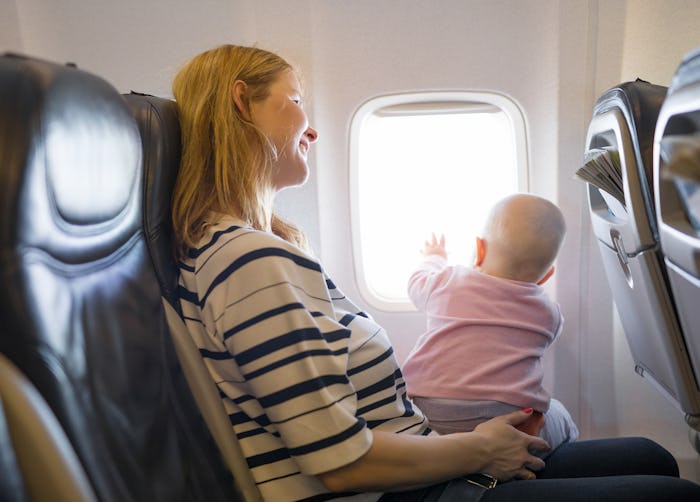Life

Here's Everything You Need To Know About Flying Internationally With Your Baby
For many families, air travel is a routine fact of life. Whether for work, vacation, or to visit far-flung relatives, most flights these days contain at least one young passenger. But while domestic travel with your child is fairly simple, flying out of the country involves more preparation. Wondering what needs to happen before flying internationally with a baby? From passports to in-flight activities, here's what you need to know to get ready for an international trip with a little one.
First of all, you don't have to follow the example of parents who give out goodie bags or other tokens of goodwill to their fellow air travelers. Your packing list is already long enough. Plus, as Karol Markowicz writes in TIME, "An airplane is not an opera, and there can be no expectation of silence." That doesn't mean you shouldn't teach your children how to behave in planes and other public spaces (although babies can't really be expected to absorb the subtleties of etiquette). Parents are always modeling appropriate behavior and children must learn (before they are adults) how to act politely around strangers. But you are not personally responsible for the comfort and happiness of everyone else on the plane. With that in mind, here are the things you really need to know before planning an international flight with your baby.
Even Babies Need Passports
A birth certificate won't cut it on an international flight. No matter how young your child is, from a few weeks to a few months, they will need a passport to board a plane destined for another country. The U.S. State Department provides step-by-step instructions for applying for a passport for children under age 16. Note that children's passports expire sooner than an adult's — in five years as opposed to 10. You'll need your child's original birth certificate and both parents must appear with the child in person at a passport acceptance facility to demonstrate consent (exceptions for extenuating circumstances are described on the website).
Lap Seat Or Car Seat
Most airlines allow children under 2 to fly free as "lap infants" on domestic flights. For international flights, airline policy varies but many carriers charge 10 percent or more of the adult fare for a lap infant, reported the Los Angeles Times. However, while the savings can be appealing, you may want to think carefully about the comfort and safety of both you and your baby. Many experts recommend purchasing a seat for your baby and keeping them strapped into a rear-facing, Federal Aviation Administration-approved carseat during takeoff, landing, and most of the flight. Consult with your pediatrician and the airline you plan to travel on before booking your tickets.
Parental ID & Consent
Obviously, you'll also need a passport to travel out of the country. However, if you don't have the same last name as your child, you may need additional proof, such as your baby's birth certificate, to show you are the parent. Additionally, some airlines may require the other parent to write a letter of consent if they are not travelling with you. Check with the airline first to see if you need permission to take your child out of the country alone.
Leave Yourself More Time To Clear Security
Flying with a baby is naturally more cumbersome than adults-only travel. From wearing your baby in a carrier to lugging a diaper bag, stroller, and carseat, leave yourself extra time to make it to the gate, especially to go through the TSA screening. Look for a TSA family lane if the airport has one. Make sure to tell the agent if you're carrying containers or bottles of breast milk or formula, noted the TSA website. And yes, you really will have to take your baby out of the carseat, stroller, or carrier so the gear can go through the x-ray machine. Try to time baby's sleep accordingly so it's not interrupted by security.
Be Prepared For Altitude-Related Ear Pain
Just as some adults chew gum on takeoff and landing to prevent ear pain, children also need protection from altitude-induced ear pressure. A pacifier is a natural fit for this scenario, but a bottle or a toy to suck on will also work, suggested Kids' Health.
Keep A Positive Attitude & Accept Imperfection
From keeping your baby entertained and trying to get them to sleep in an unfamiliar environment, to looking out for the comfort of your fellow passengers (and apologizing when disruptions occur), there's a lot going on for any parent traveling with a baby. International flights, in particular, tend to be long and overnight, making it an especially tricky experience. After you've prepared and checked all the boxes on your to-do list, you can only maintain an attitude of positive acceptance. No, things probably won't be perfect, but you'll make it through and get to enjoy your trip.
Check out Romper's new video series, Bearing The Motherload, where disagreeing parents from different sides of an issue sit down with a mediator and talk about how to support (and not judge) each other’s parenting perspectives. New episodes air Mondays on Facebook.